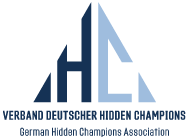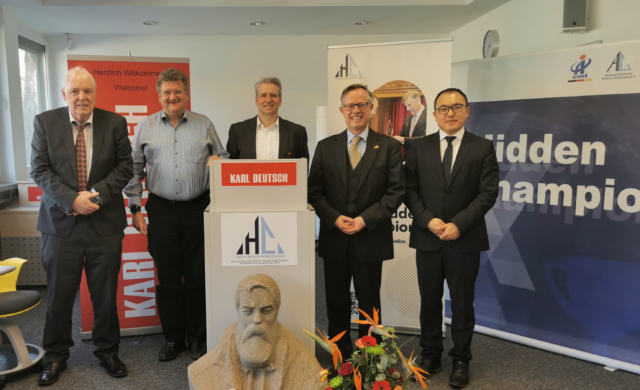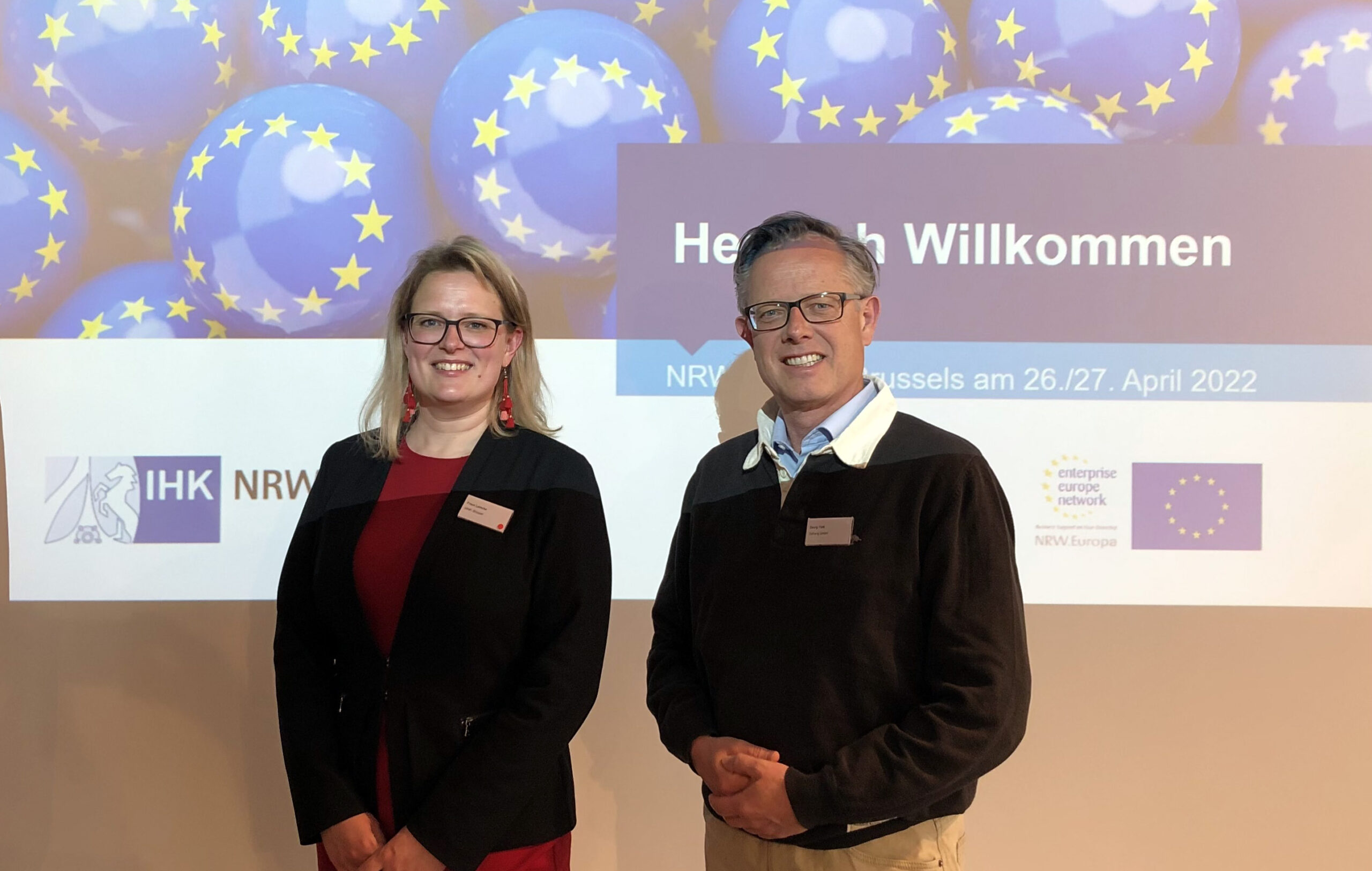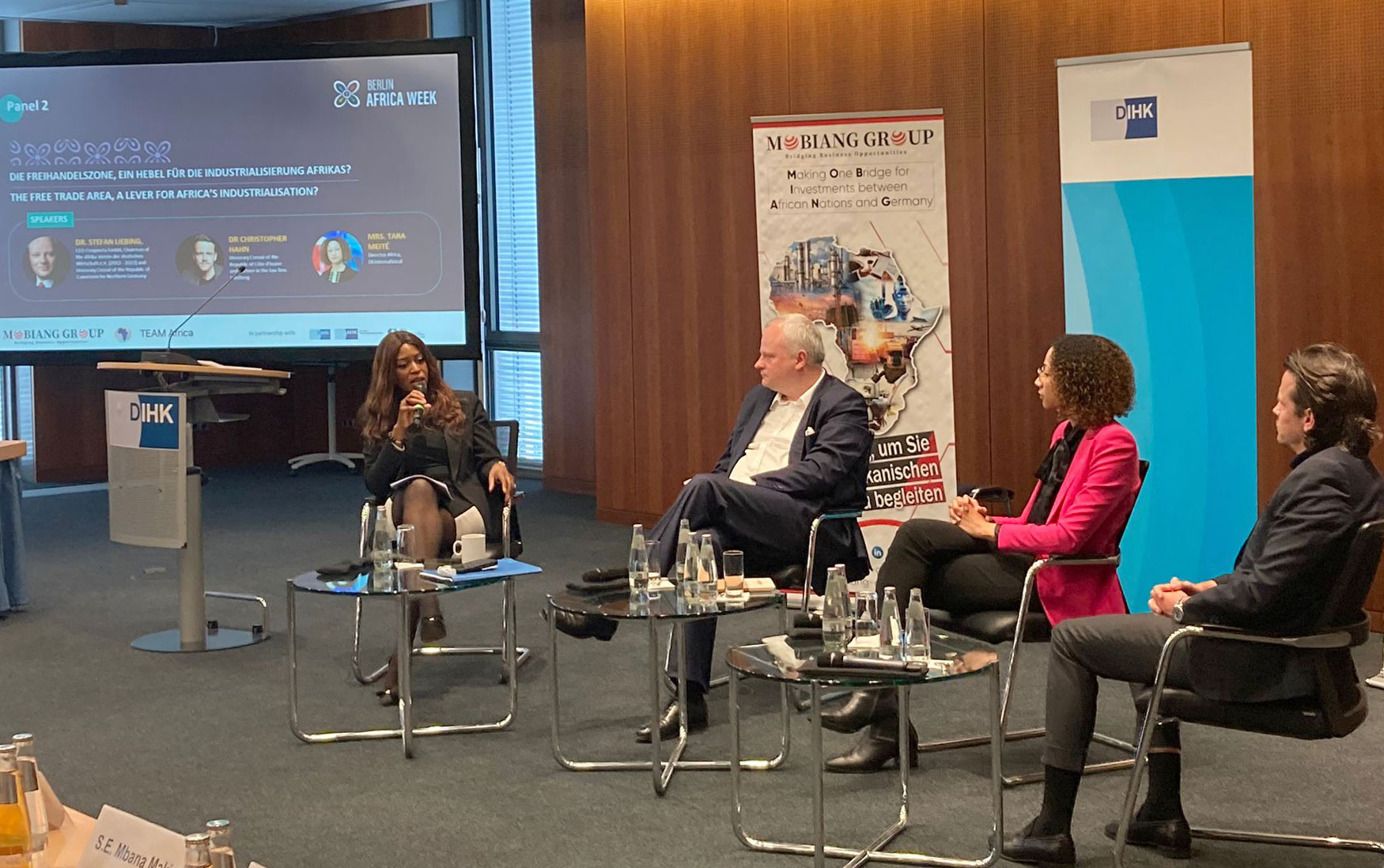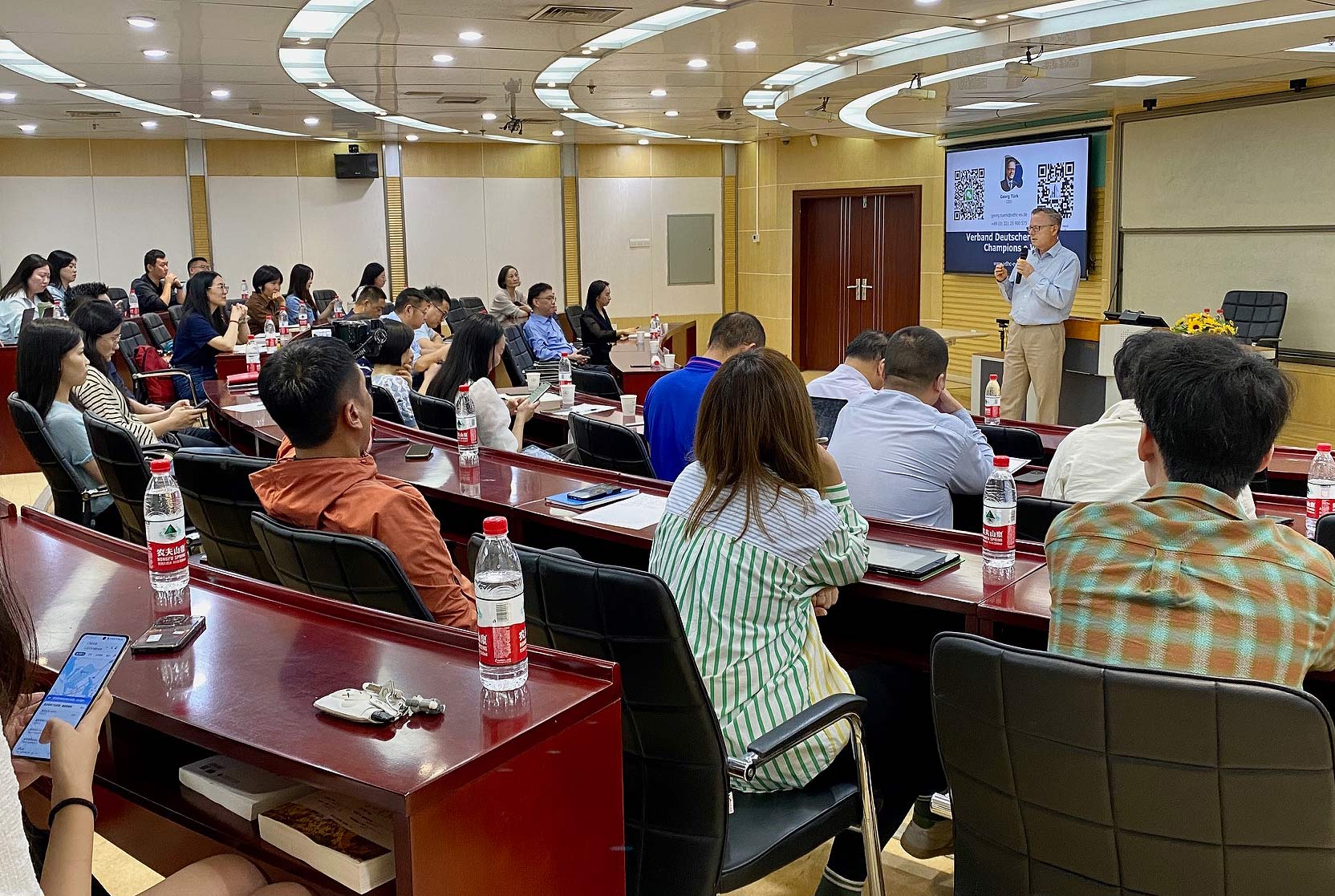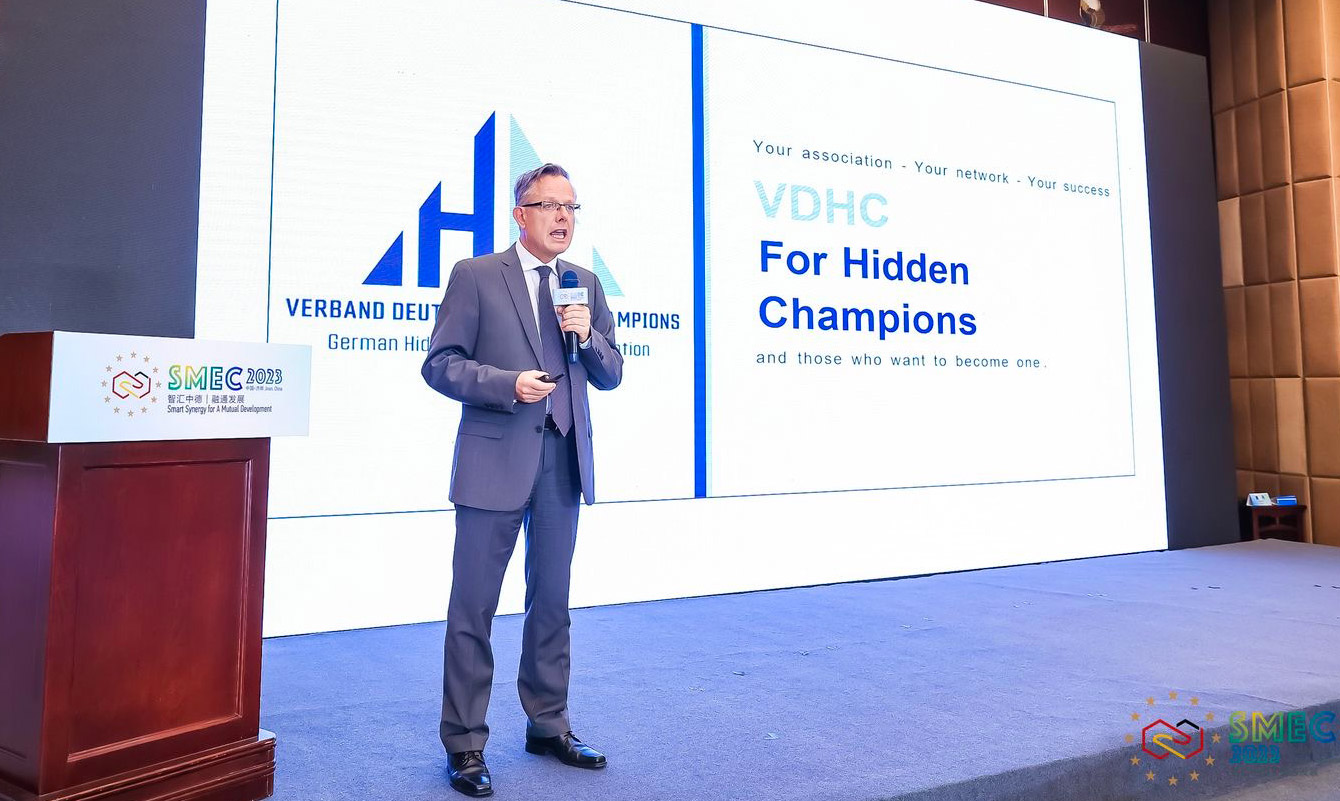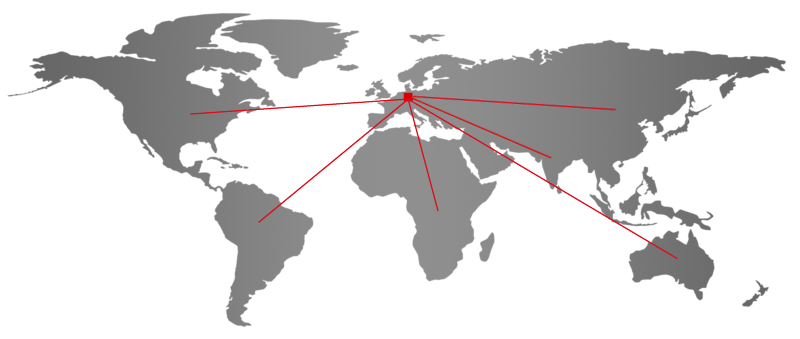Our Vision:
Strong Small-Medium-Companies
Strong Mid-Market
The `Verband Deutscher Hidden Champions e.V.´ (Association of German Hidden Champions) is an international interest and membership association -based in Germany- of medium-sized companies
-> that are Hidden Champions
or
-> want to become Hidden Champions.
We are convinced that there is a hidden champion in every SME, the backbone of our economy. Whether you are a young company or an established market player, VDHC e.V. supports you in strengthening your business relationships with partners worldwide. Discover the secrets of success of hidden champions directly from them and unleash your full potential. That is our promise:
- Your advantages
- Strengthen the SME sector!
- Become even more successful with the proven method of the hidden champions.
- Learn from the Hidden Champions themselves, among others.
- International business contacts!
- Among other things, hidden champions are leaders in exports.
- Be part of a strong network of over 1200 Business contacts, including 10% from abroad.
- International exchange of knowledge!
- Draw on the specialist knowledge of our experts on a wide range of topics at national and international level
- And benefit from our expert experience.
- Comprehensive range of services for our members!
- 1) Networking: Expand your contacts at national and international level.
- 2) Information: Deepen and share your knowledge in strategically important areas.
- 3) Events: Take part in an active exchange – online, at face-to-face events or on delegation trips.
- 4) Communication: Increase your visibility. Present your company via our platform and enjoy international attention.
- Strengthen the SME sector!
- and much more…! See the details: https://vdhc-ev.de/membership/
Our Competence
- The purpose of the association is to promote education, science and research as well as international understanding between Germany and other countries
- Member association, in particular for small and medium-sized enterprises (SMEs) that are Hidden Champions or want to become Hidden Champions
- Representing the interests of SMEs in the process of globalization
- Cosmopolitanism combined with intercultural competence
- Spreading of know-how and opportunities to implement the “Hidden Champions” corporate strategy
- Popularization of Hermann Simon's hidden champion strategy in the target group (SMEs)
- Intensification of globalization in compliance with the principles of fairness and equality
- Economic, political and social action “at eye level” in an international context
- Supporting SMEs to find their way in international markets (focus areas: Europe / Eastern Europe, Africa, Asia, India) and to operate successfully
We offer
International discussion panels
The Association of German Hidden Champions e.V. organizes prominent discussion panels on selected topics with experts from business, politics and science. Appropriate expert audiences are invited so that an intensive, target group-oriented exchange between the participants can take place.
The VDHC e.V. discussion panels are organized jointly with international partners from the media, business, science and politics.
VDHC-members can use this event format to present themselves and their companies in a topic- and target group-oriented manner.
Congresses and Roundups
The VDHC e.V. regularly invites its members to high-profile, target group-specific congresses and roundups.
Planned / to be carried out for 2024 include:
- VDHC e.V. business trip with German Hidden Champions and SME
- “Hidden Champions in Dialog” (lifestreams with experts and hidden champions)
- VDHC-partners introduce themselves
- “Hidden Champions – Learning from the Best in Theory and Practice”.
- Entrepreneur / delegation trips to Germany & European destinations
- Audio project “Success stories of German Hidden Champions
- Advanced training seminars for entrepreneurs (International)
- Cooperation events with partners
These events are attended by important representatives from business and politics. Internationally renowned speakers and the opportunity to network directly with entrepreneurs, hidden champions (and those who want to become one), decision-makers, etc. from all over the world make these events real highlights.
Business trips with Hidden Champions
Organized as a cooperation event by the VDHC e.V. with local partners, you will meet Hidden Champions, SME and decission makers in different countries and cities in Europe, Africa, Eastasia and India for an intensive mutual exchange. During these trips, you have the exclusive opportunity to present your company to potential partners as well as decision-makers from business and politics on site in targeted matchmaking sessions.
Webinars
Members of the VDHC e.V. benefit from online and hybrid events
- with experts from different industries
- on selected topics (medical technology, artificial intelligence, Industry 4.0, energy technology, electrical and building technology, mechanical engineering, business management, etc.).
In addition, the VDHC e.V. offers:
- Excellent further training, specialist knowledge, contacts etc. for managers of medium-sized companies specifically on topics that are of key importance to SMEs, such as
- innovation
- digitalization
- corporate management
- succession
- internationalization
- Provision of highly professional information (for SME globalization)
- Support in providing helpful contacts for the internationalization of SMEs
- Further training measures for business delegations in cooperation with partner universities (incl. “practical examples”)
- Heavily discounted access to the Springer Professional knowledge database
VDHC Board
Bienvenue Angui
|- Member of the expert panel for African issues at the international business council: Expertengremium - Internationaler Wirtschaftsrat (international-business-council.com)
|- Member of the expert committee for African topics at logistic-natives e.V.
|- Head of the Advisory Board of GreenTec Capital Africa Foundation (among others Dr. Bärbel Kofler, Parliamentary State Secretary at the Federal Ministry for Economic Cooperation and Development and Tomi Davies, a well-known Nigerian-British investor, speaker, author, entrepreneur, philanthropist and advisor to technology companies.
Georg Josef Türk
He was and is responsible for the German - European - international orientation, including member contact and support.
His professional expertise spans well-known companies such as APPLE, Zeppelin-Caterpillar, Egmont publishing companies and medium-sized German SMEs. He specialises in international business development and business establishment as well as international B2B / B2C sales marketing & new media communication.
Rafael Suchan
He holds an MBA from Tsinghua University in Beijing and Nanyang Technological University in
Singapore. He also holds a Master's degree (Diplom-Kaufmann) from
the University of Applied Sciences (FOM) in Essen, Germany.
Kai-Marcel Dodel
After working for thyssenkrupp Automotive, MAN, STIHL (China), ZF Group (China), among others, he has been working as an interim manager for western medium-sized companies in China since June 2023. He is also the founder of a Chinese company specialising in autonomous long-haul logistics.
Prof. Dr. Manuel Vermeer
He is a long-standing specialist for India, with a focus on personnel recruitment, management, strategy, intercultural management, leadership and coaching. He is also Senior Advisor Asia at the Mannheim Business School, Senior Advisor of the Taplow Group and Member of the Board of Asian Studies, Somaiya University, Mumbai, India.
Dieter Böning († January 2024)
Among other things, he was managing director of several medium-sized companies, co-founder and for decades chairman of the 'Gesellschaft für Deutsch-Chinesische Düsseldorf e.V.' and the 'Allianz der Deutschen China-Gesellschaften e.V.'. With inexhaustible energy and great cordiality, Dieter Böning has always worked for a trusting understanding between the two countries.
Competence Board
Special Europe
Prof. Danica Purg
The President of the Republic of Slovenia awarded her the "Order of Freedom of Honour" for her contribution to management development in Slovenia and Central and Eastern Europe.
Prof. Dr. Engelbert Westkämper
Professor Westkämper is a member of the Academy of Engineering (acatech) and has served on numerous committees of German and European research organisations.
More than 800 publications with his involvement have appeared in national and international journals. He has been retired since September 2011 and has written several books published by Springer Verlag.
Prof. Dr.-Ing. Thomas Gartzen
Since 2021, Prof. Gartzen has been teaching and researching at Cologne University of Applied Science (TH Köln) in the field of Manufacturing Systems in close cooperation with industry. He heads the Laboratory for Manufacturing Systems, where solutions are developed that enable the manufacturing industry to transform into intelligent and sustainable manufacturing systems. The application and further development of digitally connected technologies such as Internet-of-Things solutions, artificial intelligence and new human-technology interfaces are central to this.
Rüdiger Goll
After his economic studies, Rüdiger Goll joined Bayerische Vereinsbank and acted in an advisory capacity to medium-sized companies and big internationally operating groups.
Afterwards he worked for Banque Paribas for many years where he advised national and international conglomerates. He built up the bank’s German and international M&A-business and later became this sector’s managing director. During this period, he and his international team closed a multitude of domestic and cross-border transactions.
Special Afrika
Prof. Dr. Philipp von Carlowitz
After several management positions at BASF SE and Siemens AG, he has been Professor of International and Strategic Management at the ESB Business School at Reutlingen University since 2011.
His research focuses on business activities in Africa, which he has documented with numerous publications and studies on various business-related topics. His work focuses in particular on strategic management, internationalization and Go2Market approaches, growth strategies and business models in Africa.
Special Arabian World / UAE
Sam Hasner
Sam Hasner works as an advisor in the field of international diplomacy for the Director General of the National Media Council in the Emirates and plays a key role in shaping the image of the Emirates in the German media. In addition, he has intensified his relations at government level in Saudi Arabia, Qatar, Kuwait and Oman; in the Gulf States he works with leading German and Arab companies and is firmly established as a key figure in German-Arab business and media relations.
Special Eastasia incl. China
Prof. Dr.-Ing. Savas Tümis
Kai-Marcel Dodel
Dr. Cord Eberspächer
He is particularly involved in educational exchanges between China and Germany, especially in the field of vocational training; among other things, he works together with Wuhu Nuobang Jingchengde China Education Technology Co. Ltd.
Special India
Special Energy/Environment
Jan Ackermann
Rafael Suchan
Rafael Suchan's experience reflects the current dynamics and demands of the industry: using cutting-edge technology and know-how to transform businesses to become truly circular - to reduce CO2 emissions and become sustainable in the long term.
© Statutes of the Association of German Hidden Champions e.V.
– Based on the statutes, 1st version established in the founding meeting on June 07, 2019, amendments/additions adopted in the general meeting on 05.09.2024.
§ 1 Name, registered office and financial year
1. The Association shall bear the name “Verband Deutscher Hidden Champions e.V.”
2. The Association is entered in the register of associations at the competent Düsseldorf
Local Court under No. 11934 (date of entry: 04.02.2020)
3. The registered office of the Association is in Düsseldorf, Germany
4. The financial year is the respective calendar year
5. The association is politically, ethnically and denominationally neutral and independent.
It is not geared towards generating profits and surpluses.
§ 2 Purpose of the association
1. The association pursues exclusively and directly non-profit purposes within the
meaning of the section “Tax-privileged purposes” of the German Tax Code.
2. The purpose of the Association is to promote education, science and research as well
as international understanding between Germany and other countries.
3. The purpose of the statutes is realized in particular by
• Organizing scientific and social events that serve the exchange of information
on the economy, history and culture of Germany and other countries
• Facilitating the exchange of information and experience
• Collecting information material and issuing publications
• Establishing, deepening and maintaining relations with other countries
• The promotion of education through training and further education measures
• The promotion of scientific research and academic cooperation
• The networking of members, sponsors and with teaching and research
institutions, colleges and universities.
4. The association may establish or participate in companies to pursue its purpose.
§ 3 Objectives of the association
1. To strengthen German SMEs, in particular through international networking
2. To disseminate the theory of “hidden champions” so that international SMEs can learn
from the experience of hidden champions
3. To support and advise SMEs on economic, legal and technological issues
4. Promoting the regional, national and international development of small and mediumsized
enterprises (SMEs)
5. Promotion of research and development in SMEs
6. Promotion of training and further education as well as the organization of training
courses and seminars
7. Representing and promoting the interests of small and medium-sized enterprises visà-
vis politics, administration and the public
8. To promote exchange and cooperation between SMEs
9. Promoting cooperation with teaching and research institutions, colleges and
universities.
§ 4 Selfless activity
1. The Association shall act altruistically; it shall not primarily pursue its own
economic purposes.
2. The purpose is not to conduct commercial business. It is not intended to make a
profit. Any profits may only be used for statutory purposes.
§ 5 Use of funds
1. Funds of the association may only be used for the purposes set out in the articles of
association. Members shall not receive any benefits from the Association’s funds.
2. No person may benefit from expenses that are alien to the purpose of the association
or from disproportionately high remuneration.
§ 6.a Membership
1. Any natural or legal person who supports the objectives of the association, who is
committed to the objectives of the VDHC e.V. and who is willing to promote these
objectives through their cooperation may become a member of the association.
2. The application for membership must be submitted in writing. The Select Committee
shall make a final decision on the application for membership by simple majority. The
applicant shall be notified in writing of the decision to accept or reject the application
without stating reasons.
3. Membership begins with the handover of the Articles of Association, which must be
signed by the member and the Executive Board in accordance with § 26 (2) BGB, as
well as the payment of the corresponding contribution in accordance with § 9
(contributions).
4. Membership ends upon resignation, expulsion or death (in the case of natural
persons) or dissolution as well as loss of legal capacity and upon the opening of
insolvency proceedings.
5. Membership is non-transferable and non-inheritable. The exercise of membership
rights cannot be transferred to another person.
6. A member may be excluded at any time for good cause by the Executive Board with
immediate effect by a 3/4 majority. Unilateral termination of membership may occur,
for example, if the member is in arrears with the payment of due contributions despite
a reminder. The member must be informed of the termination of membership in
writing. The member must be given the opportunity to comment in writing before the
resolution is passed.
7. Unilateral revocation or exclusion shall not affect the membership fee obligations
incurred to date.
8. Resignation must be declared in writing to an authorized member of the Executive
Board with a notice period of 6 weeks to the end of the current financial year.
§ 6.b Membership regulation for companies
1. Unique company membership:
a. Each member may only become a member of the Association in
connection with a single company. Dual membership with several
companies is not permitted.
b. The multiple membership of members who are already members with
several companies ends automatically at the end of the 2024 financial year.
2. Submission of applications:
a. When applying for membership, the member must name the company with
which it wishes to become a member.
3. Change of company affiliation:
a. A change of company affiliation during membership is possible, but
requires written notification to and approval by the Board of Directors.
Membership with the previous company ends automatically when the new
company affiliation is confirmed.
4. Termination of membership:
a. Should a member lose its connection to the company with which it has
become a member, membership shall end automatically unless a new
company is named and approved by the Board of Directors within one
month.
§ 6.c Representation by company and change of representation:
1. Corporate membership:
a. If a company is a member of the Association, it shall be represented by a
natural person (usually the Managing Director).
2. Change of representation:
a. Should the natural person representing the company leave (e.g. due to
death, resignation or change of position), the company has the right to
appoint a new representative. The membership of the company remains
unaffected.
3. Duty of notification:
a. The company must immediately notify the Executive Board in writing of the
change of representative and appoint a new representative.
4. Automatic termination:
a. If the company fails to appoint a new representative within a period of two
months, the company’s membership shall automatically expire.
§ 7 Honorary and supporting members
1. Natural or legal persons who have rendered outstanding services to the fulfillment of
the purpose of the Association as well as outstanding public figures may be appointed
honorary members by the General Assembly.
a. Honorary members are exempt from the Association fee.
b. Honorary members may resign at any time.
2. Any member may also become a supporting member.
a. Any natural or legal person who supports the Association’s objectives by
making contributions and donations over and above the membership fee may
become a supporting member.
§ 8 Rights and obligations of ordinary members
1. All ordinary members may participate in the Association’s public events.
2. All ordinary members have the right to submit proposals to the Executive Board and
the General Assembly and to make suggestions regarding the activities of the
Association.
3. The ordinary member is obliged to support and promote the Association and the
purpose of the Association in a proper manner, both externally and internally.
§ 9 Contributions
1. Members shall pay contributions in accordance with a resolution of the General
Meeting.
2. The amount and due date of the contributions shall be determined by the General
Meeting.
3. All members (personal and legal members; legal members in Germany or abroad) are
liable to pay contributions – with the exception of honorary members.
4. Different fees are set for members based in Germany and abroad.
5. Members who have not paid the due annual membership fee within 14 days of a
reminder may be excluded from the VDHC e.V. by a simple majority vote of the
Executive Board without consulting a General Meeting.
a. These members must be advised of their exclusion in writing.
b. In consultation with the Executive Board, they can reverse the exclusion by transferring the amount due within four weeks of notification.
6. Honorary members are exempt from paying a contribution.
7. The Executive Board may defer contributions and levies.
8. No further contributions shall be levied in the subdivisions of the Association.
9. The General Meeting shall decide on the amount of any levies by simple majority on
the proposal of the Executive Board.
§ 10 Bodies of the Association
1. The bodies of the Association are
a. the General Meeting,
b. the Executive Board
c. the Management Board
d. the Advisory Board (Competence Board)
e. the treasurer and the cash auditor (auditing body).
2. the bodies must act in the interests of the association; they must protect confidential
information that they receive in the course of their activities and may not disclose it
without authorization.
§ 11.1 General Assembly of Members
1. The General Assembly of Members is the supreme body of the Association. It has the
following tasks in particular:
a. the election and removal of the Executive Board
b. Discharge of the Executive Board,
c. Acceptance of the reports of the Executive Board
d. Election of the cash auditors
e. Determination of contributions and their due date
f. Resolution on amendments to the Articles of Association
g. Resolution on the dissolution of the Association
h. Deciding on the admission and exclusion of members in cases of appeal and
i. other tasks, insofar as these arise from the Articles of Association or by law.
2. An ordinary general meeting shall be held once a year in the first quarter of each
financial year. It is not open to the public.
3. Only those members who have duly transferred the full membership fee to the
Association’s account at least 4 weeks before the General Meeting are entitled to
vote.
4. The General Meeting shall be convened in writing by e-mail by the Executive Board,
giving four weeks’ notice and stating the agenda. Members who wish to be invited by
post must inform the Executive Board in writing.
5. Proof that the invitation has been sent by e-mail (standard) or post (exception) in good
time is sufficient to ensure that it has been duly sent.
6. The agenda of the General Meeting must include the following items in particular:
a. Report of the Chairman,
b. Report of the management,
c. Discharge of the Board of Directors and the management,
d. Elections, if provided for in the Articles of Association,
e. Passing resolutions on motions submitted.
7. Motions must be submitted in writing to the Executive Board at least two weeks before
the General Meeting. The time of receipt is decisive. Motions received at a later date
shall be dealt with at the General Meeting if the majority of the members present and
entitled to vote agree to their being dealt with. Motions must be submitted to the
members in writing on the day of the meeting.
8. The invitation letter shall be deemed to have been received by the members if it was
sent to the last address (email/postal) notified to the Association.
9. An Extraordinary General Meeting shall be convened without delay if the interests of
the Association so require or if at least one third of the members entitled to vote
request such a meeting in writing to the Select Committee. The convocation by the
Board of Directors and the request for convocation by the members must be made in
writing, stating the purpose and reasons.
10. The Chairman or Deputy Chairman chairs the General Meeting. At the proposal of the
Chairman or Deputy Chairman, the General Meeting may appoint a special
chairperson.
11. The course of the General Meeting and, in particular, the resolutions are recorded in
writing in minutes and must be signed by two members of the Board of Directors
authorized to represent the company and the secretary.
§ 11.2 Convening and holding the General Meeting
1. The General Meeting may be held in person, digitally or in a hybrid form at the
decision of the Board of Directors.
2. The invitation to the General Meeting shall specify the form (presence, digital and/or
hybrid) and the technical requirements for participation.
3. In the case of a digital or hybrid meeting, the access data and technical instructions
for participation must be enclosed with the invitation
4. In the case of a digital or hybrid meeting, members shall be enabled to participate via
a suitable online platform
5. The association shall ensure that the online platform enables secure participation and
that all members can exercise their membership rights, in particular their voting rights
6. Each member is responsible for creating the technical requirements for participation
(e.g. internet access, end device, software).
7. Each member may appoint a representative with voting rights.
8. A general meeting held digitally or in hybrid form shall constitute a quorum regardless
of the form of participation if it has been duly convened.
9. Voting shall be by non-secret ballot as follows:
a. In the presence form by a visually unambiguous show of hands
b. In digital or hybrid form, it must be ensured that the vote of each participating
member can be clearly assigned and counted, e.g. by means of a voting tool
on the online platform and/or a visually unambiguously assignable show of
hands and/or voting in the chat room or similar.
10. The results of votes must be made known to the members immediately after the
conclusion of the vote.
11. Minutes must be kept of the general meeting, recording the main contents and
resolutions of the meeting.
12. In the case of digital or hybrid meetings, the minutes may be kept in electronic form.
However, they must meet the same requirements in terms of content and reliability as
written minutes.
§ 12 Voting rights, quorum
1. The General Meeting shall constitute a quorum regardless of the number of ordinary
members present.
2. Each member has one vote. The right to vote can only be exercised in person or on
behalf of a legal member by submitting a written power of attorney or ‘voting proxy’.
Abstentions and invalid votes shall not be taken into account.
3. The General Meeting passes its resolutions by a simple majority of the valid votes
cast. Amendments to the Articles of Association and resolutions on the dissolution of
the Association require a majority of three quarters of the valid votes cast.
4. Elections to the Executive Board and the election of the treasurer/auditor as well as
voting on issues and motions shall be carried out in accordance with the provisions of
§ 11.2.
5. Motions concerning the dismissal of the Executive Board, amendments to the Articles
of Association and the dissolution of the Association that have not already been sent
to the members with the invitation to the General Meeting may only be resolved at the
following General Meeting.
§ 13 Executive Board
1. The Executive Board consists of the Chairperson and up to four Deputy Chairpersons.
2. At least two members of the Executive Board may jointly represent the Association
externally.
3. the Executive Board shall decide by a simple majority of its votes. In the event of a tie,
the Chairman shall have the casting vote.
4. The Board of Directors is elected by the General Meeting for a term of five years.
5. Only ordinary members of the Association may become members of the Executive
Board.
6. Re-election is permitted without restriction.
7. The Executive Board manages the Association’s business and represents the
Association in and out of court.
At least two members of the Executive Board shall represent the Association jointly.
8. The Executive Board may appoint a managing director for an unlimited period of time
or a managing director may be permanently employed by the Executive Board if the
financial situation permits this. The managing director must be an ordinary member,
but not a member of the Executive Board.
9. The Executive Board passes its resolutions by simple majority. In the event of a tie,
the Chairman has the casting vote.
The Executive Board shall remain in office until a new Executive Board has been
elected.
10. The Executive Board is responsible for the Association’s objectives in accordance with
§ 2 and § 3 as well as the other tasks assigned to it in these Articles of Association
and represents the Association in public.
11. The Chairman and up to four Deputy Chairmen are elected individually by the General
Meeting. Proposals for candidates must be submitted in writing to the current Board of
Directors at least three weeks before the General Meeting.
12. At hybrid events, elections can only be held by open ballot. If the number of
candidates does not exceed the number of positions to be filled, the candidates with
the most votes are elected as Chairperson and (up to four) Deputy Chairpersons
(majority vote).
13. Additional paid work by members of the Executive Board within and outside the
Association and subdivisions of the Association is permitted.
§14 Advisory Board (Competence Board)
1. The Executive Board may appoint the members of the Competence Board.
2. Only ordinary members of the VDHC e.V. who are members of the Executive Board,
managing directors, personalities and executives of companies and institutions may
become members of the Competence Board.
3. The Advisory Board advises the Executive Board on all activities and strategic
decisions; it is legally dependent in its function.
4. The Advisory Board has a predominantly advisory function.
5. The Executive Board may regulate the organization and special responsibilities of the
Advisory Board in its own regulations.
6. Meetings of the Advisory Board shall be convened by the Executive Board.
§ 15 Organizational structure
1. The Association may also form professionally and/or locally defined working groups
and individual initiatives which, within the scope of their work, contribute to the
fulfillment of the statutory tasks of the Association as a whole. All persons participating
in such working groups and individual initiatives should be representatives of
members of the Association. The following applies to the formation of such
subdivisions
a. Their establishment, dissolution and merger with other working groups and
individual initiatives require the approval of the Executive Board.
b. The statutes and rules of procedure of the association are binding for them.
c. In order to finance their work within the framework of the Association’s budget
planning, they may be allocated earmarked funds for administration under their
own professional responsibility.
§ 16 Treasurer / Cash auditor (auditing body)
1. The General Meeting shall elect a treasurer and an auditor for a term of one year.
2. The treasurer may be a member of the Board of Directors; the auditor may not be a
member of the Board of Directors.
3. The Board of Directors may appoint an external tax consultant for the bookkeeping.
The position of treasurer must be held by a member; the position of auditor may also
be held by an external tax consultant in consultation with the Executive Board.
4. The cash auditor is obliged to regularly and carefully audit the association’s finances.
It must ensure that the accounts are correct and that there are no irregularities.
5. After the audit, the treasurer and cash auditor must report to the general meeting and
point out any discrepancies or risks.
6. Re-election is permitted.
§ 17 Annual financial statements and audit
1. The Executive Board shall prepare the annual financial statements of the Association
without delay, at the latest within two months of the end of the financial year.
2. It shall be audited by the auditor(s) elected by the General Meeting and presented to
the next ordinary General Meeting for approval.
§18 Dissolution of the Association
1. The dissolution of the Association can only be decided at a General Meeting
convened for this purpose.
2. The general meeting shall decide on the dissolution of the Association with a 2/3
majority of votes. The General Meeting at which the dissolution of the Association is to
be decided shall only have a quorum if at least half of the members entitled to vote
are present or represented. If this general meeting does not constitute a quorum, a
second general meeting shall be convened within one month, which shall constitute a
quorum regardless of the number of members present or represented, provided that
this has been indicated in the invitation to the new general meeting.
3. Unless the last general meeting decides otherwise, the Chairman of the Board of
Directors shall become the liquidator with sole power of representation when the
resolution to dissolve takes effect.
4. In the event of dissolution or annulment of the corporation or if the tax-privileged
purposes cease to exist, the assets of the corporation shall be transferred to a person
under public law or another tax-privileged corporation for the purpose of promoting
international understanding between Germany and other countries and/or for the
promotion of education, science and/or research.
5. The members shall have no claim to the Association’s assets upon dissolution of the
Association.
6. In the event of dissolution of the Association or discontinuation of tax-privileged
purposes, the assets of the Association shall be transferred to a legal entity under
public law or another tax-privileged corporation to be determined by the last General
Meeting for the purpose of promoting small and medium-sized enterprises.
§ 19 Special provisions
1. The Board of Directors may amend the Articles of Association without the involvement
of the General Meeting if and insofar as the registry court or other authorities impose
conditions and/or demand amendments.
2. The amendments must be announced to the General Meeting in writing.
§ 20 Final provisions
1. Insofar as no other provisions are made in these Articles of Association, the
provisions of the German Civil Code (BGB) shall apply.
2. the original articles of association were established at the founding meeting on June
7th, 2019 – and amended at the general meeting on Sep 5th, 2024
3. These Articles of Association will only come into force after the General Meeting on September 5, 2024 when they are entered in the association register (in preparation).
